Hammer Film Productions Ltd. is a British film production company based in London. Founded in 1934, the company is best known for a series of Gothic horror and fantasy films made from the mid-1950s until the 1970s. Many of these involve classic horror characters such as Baron Victor Frankenstein, Count Dracula, and the Mummy, which Hammer reintroduced to audiences by filming them in vivid colour for the first time. Hammer also produced science fiction, thrillers, film noir and comedies, as well as, in later years, television series.
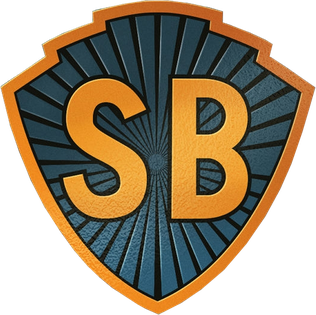
Shaw Brothers (HK) Limited was the largest film production company in Hong Kong, and operated from 1925 to 2011.
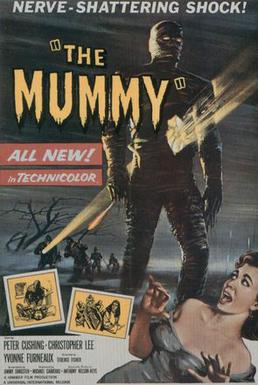
The Mummy is a 1959 British horror film, directed by Terence Fisher and starring Peter Cushing and Christopher Lee. It was written by Jimmy Sangster and produced by Michael Carreras and Anthony Nelson Keys for Hammer Film Productions. The film was distributed in the U.S. in 1959 on a double bill with either the Vincent Price film The Bat or the Universal film Curse of the Undead.

Blood from the Mummy's Tomb is a 1971 British horror film starring Andrew Keir, Valerie Leon and James Villiers. It was director Seth Holt's final film, and was loosely adapted from Bram Stoker's 1903 novel The Jewel of Seven Stars. The film was released as the support feature to Dr. Jekyll and Sister Hyde.

Tommy Tam Fu-wing, known professionally by his stage name Ti Lung, is a Hong Kong actor, known for his numerous starring roles in a string of Shaw Brothers Studio's films, particularly The Duel, The Blood Brothers, Clans of Intrigue, The Avenging Eagle, The Sentimental Swordsman and its sequel, as well as the classic John Woo film A Better Tomorrow and its sequel.
Alexander Fu Sheng, also known as Fu Sing, was a Hong Kong martial arts actor. One of Hong Kong's most talented performers, Fu rose to prominence in the 1970s starring in a string of movies with the Shaw Brothers that accrued him international stardom throughout Asia and parts of North America.

The Gorgon is a 1964 British horror film directed by Terence Fisher for Hammer Films. It stars Christopher Lee, Peter Cushing, Richard Pasco and Barbara Shelley.

The Legend of the 7 Golden Vampires is a 1974 martial arts horror film directed by Roy Ward Baker. The film opens in 1804, when seven vampires clad in gold masks are resurrected by Count Dracula. A century later, Professor Van Helsing, known in the world for his exploits with Dracula, is recruited by a man and his seven siblings after giving a lecture at a Chinese university to take on the vampires. The film is a British-Hong Kong co-production between Hammer Film Productions and Shaw Brothers Studio.

Bray Film Studios is a British film and television facility in Water Oakley near Bray, Berkshire. It is best known for its association with Hammer Film Productions.

The Revenge of Frankenstein is a 1958 Technicolor British horror film directed by Terence Fisher and starring Peter Cushing, Francis Matthews, Michael Gwynn and Eunice Gayson. Made by Hammer Film Productions, the film was a sequel to The Curse of Frankenstein, the studio's 1957 adaptation of Mary Shelley's 1818 novel Frankenstein; or, The Modern Prometheus, and the second instalment in their Frankenstein series.
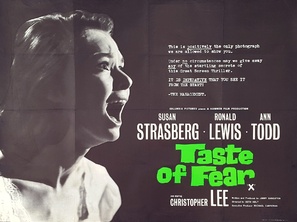
Taste of Fear is a 1961 British thriller film directed by Seth Holt. The film stars Susan Strasberg, Ronald Lewis, Ann Todd, and Christopher Lee in a supporting role. It was released in the United States as Scream of Fear.

The Man Who Could Cheat Death is a 1959 British horror film, directed by Terence Fisher and starring Anton Diffring, Hazel Court, and Christopher Lee. Jimmy Sangster adapted the screenplay from the play The Man in Half Moon Street by Barré Lyndon, which had been previously filmed in 1945. The Man Who Could Cheat Death was produced by Michael Carreras and Anthony Nelson Keys for Hammer Film Productions. It was released in the US on 19 August 1959 and in the UK on 30 November 1959.
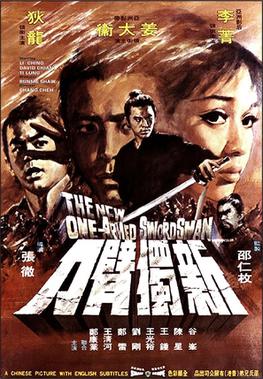
The New One-Armed Swordsman is a 1971 Hong Kong wuxia film directed by Chang Cheh and produced by the Shaw Brothers Studio, starring David Chiang. Chiang replaced Jimmy Wang, the star of the two preceding films in the series, The One-Armed Swordsman and Return of the One-Armed Swordsman.
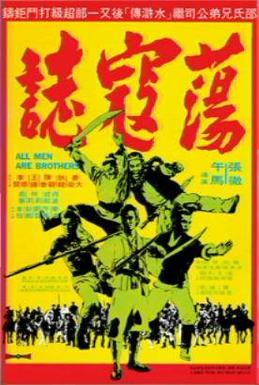
All Men Are Brothers, also known as Seven Soldiers of Kung Fu, is a 1975 Hong Kong wuxia film based on the Chinese classical 14th century novel Water Margin. The film was produced by the Shaw Brothers Studio and directed by Chang Cheh and Wu Ma.

Just Heroes is a 1989 Hong Kong crime film, directed by John Woo and Wu Ma. The film stars Danny Lee, David Chiang and Stephen Chow.
Four Riders, a.k.a. Hellfighters of the East, is a 1972 Hong Kong film directed by Chang Cheh. It stars David Chiang, Ti Lung Chen Kuan-Tai, Wang Chung and Yasuaki Kurata.

Shanghai 13, also known as The Shanghai Thirteen, is a 1984 Hong Kong-Taiwanese martial arts film written and directed by Chang Cheh and starring an ensemble cast of notable film stars such as Andy Lau, Jimmy Wang Yu, Ti Lung, Chen Kuan-tai, Danny Lee, Bryan Leung, David Chiang, Chiang Sheng, Chi Kuan-chun, Chan Sing, Lu Feng and more.
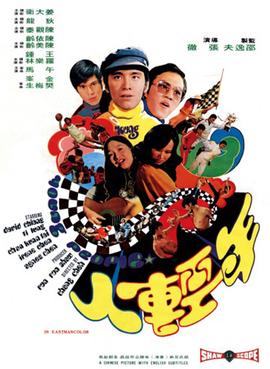
Young People is a 1972 Hong Kong coming-of-age action drama film directed by Chang Cheh and starring David Chiang, Ti Lung, Chen Kuan-tai, Irene Chan and pop singer Agnes Chan, the younger sister of Irene Chan, in her debut film role.
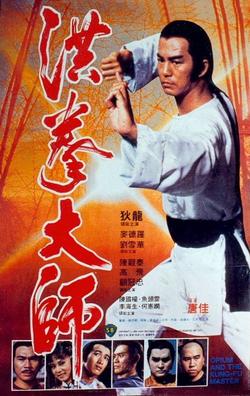
Opium and the Kung-Fu Master is a 1984 Hong Kong martial arts film directed by Tang Chia, who also serves as one of the film's action directors, and stars Ti Lung as the titular protagonist.

Tales of Frankenstein is an unsold TV pilot filmed in 1958. It was a co-production of Hammer Film Productions and Columbia Pictures. The film is a mixture of elements from both the Hammer and Universal Pictures versions of Frankenstein, based on Mary Shelley's 1818 novel Frankenstein; or, The Modern Prometheus. The episode title, which does not appear onscreen, is "The Face in the Tombstone Mirror". The film is in the public domain.

















